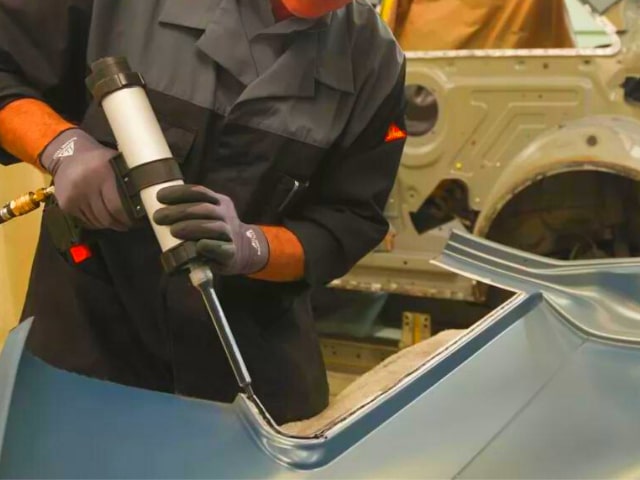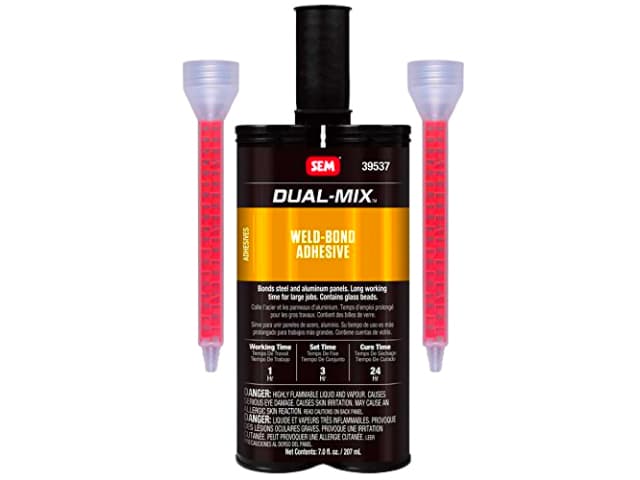The two most common methods of joining metal pieces are metal glue and welding. It depends on several factors which technique is most appropriate for each situation. Here, I will compare panel bonding adhesive or metal glue vs. welding, highlighting their differences and similarities, so that you can make an informed decision.
Panel Bonding Adhesive / Metal Glue Vs. Welding
What is Metal Glue or Panel Bonding Adhesive?
Metal glue, also called structural adhesive, bonds metal surfaces together. In industries requiring strong and durable bonding, such as automotive, aerospace, and construction, it is commonly used.
Chemical bonds are formed between metal surfaces when metal glue is applied. When metal glue is applied instead of welding, the properties and structure of the metal do not change. As a result, it is ideal for bonding metals that cannot be welded or for applications where welding is not feasible.
Different types of metal glue are available for different applications and metal types. Among the most common types of adhesives are cyanoacrylate, polyurethane, acrylic, silicone, and epoxy adhesives. Each type has its own properties, such as cure time, strength, and chemical resistance.

Pros and Cons of Metal Glue
Pros
- Easy to use.
- No heat is required.
- High strength.
- Metal is less likely to warp or distort.
Cons
- Limited to certain metal types.
- Longer curing time.
- Limited temperature resistance.
Read More: How To Use 3M Panel Bonding Adhesive?
What is Welding?
The welding process involves heating two or more metal pieces to their melting point and then allowing them to cool, creating a strong bond between them. Various industries, such as construction, automotive, and manufacturing, use it extensively to ensure the strength and durability of joints.
A variety of welding methods exist, such as arc welding, gas welding, and resistance welding. For each method, different equipment and techniques are used to heat and melt the metal.
There are several advantages to welding over other bonding methods. Among its benefits is that it can form a strong, durable bond that is capable of enduring a great deal of pressure and stress. Additionally, it creates a smooth and seamless joint, making it a visually appealing method of bonding.

Pros and Cons of Welding
Pros
- Strong bond.
- Suitable for thick metal pieces.
- High-temperature resistance.
- Precise.
- Versatile.
Cons
- Expertise and equipment needed.
- Metal may warp or distort.
- Limited to certain joint types.
Read More: 3M 08115 Vs. 08116
Which One Should You Use? Metal Glue or Welding?
The choice between metal glue and welding is based on some factors, including the type of metal, the strength required, and the skill level and equipment available. Metal glue is an excellent choice if you need a strong bond but don’t need it to cure fast. Also, it is an excellent option for those who do not have welding equipment or experience.
On the other hand, when metal pieces are stressed or under pressure, welding is a perfect method of creating a strong, permanent bond. Moreover, it provides a strong, continuous joint when joining thick metal pieces. A beginner or person without welding experience may find welding challenging and costly, as it requires specialized equipment and expertise.
Is Metal Glue as Strong as Welding?
Several factors affect the strength of metal glue versus welding, such as the type of metal being bonded, the glue used, and the application requirements.
Due to the melting and fusing of the metal, welding produces a bond as strong as the base metal, making welding stronger than metal glue. As well as creating a seamless and continuous joint, welding is capable of withstanding high pressure and stress. Furthermore, welded joints tend to be more visually appealing and have a higher level of precision than glued joints.
On the other hand, metal glue forms a bond by forming a chemical reaction between it and the metal surface. In certain applications, metal glue may not be as strong as welded joints, even though it creates a strong and durable bond.
However, metal glue has several advantages over welding. There is no need for special equipment, and metal glue is less likely to distort or warp the metal. Moreover, metal glue bonds aluminum, stainless steel, copper, and brass, as well as dissimilar metals.
Read More: JB Weld Strength vs. Welding
Last Opinion
The choice between welding and metal glue depends on the application specifications and limitations. But welding is generally considered stronger than metal glue.
Whenever welding is not practical or desirable, metal glue can provide an effective and unique bonding solution. In this article, I try to compare metal glue vs. welding. Hopefully, it helps you understand them clearly.

